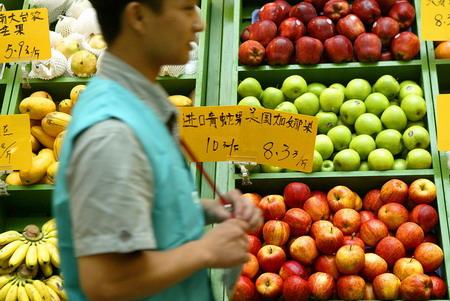
Imported fruit displayed at a supermarket in Beijing. China imports many agricultural products, like fruit, from the US. [Shao Xian / For China Daily]
BEIJING - The shifting market dynamics of the food industry in China offer immense opportunities for American companies to boost exports of agricultural products, a top US official said on Tuesday.Eric Trachtenberg, director of the agricultural trade office at the US embassy in Beijing, told China Daily that there have been significant changes in the consumption pattern in China with demand for imported products still strong.
"We often tell exporters that China is the place to be. Many US agricultural companies are keen on exploring opportunities here," said Trachtenberg.
The US exports many agricultural products to China with soybeans the top commodity in terms of value, he said. Economic development has bought about significant changes in the Chinese food industry. With urbanization and income levels growing, people are becoming more and more conscious of food safety and handling, he said.
With land resources fast getting depleted, there is also an increasing awareness of the quality of food and how it is packaged and transported.
US companies can cash in on these factors and boost exports to China over the next five to 10 years, Trachtenberg said on the sidelines of the Second US-China Cold Chain Standards and Regulations Conference in Beijing.
Cold chain is essentially a temperature-controlled supply chain and involves a series of storage and distribution solutions that ensures the shelf life of agricultural products such as meat and vegetables.
"The cold chain industry will boom in China as food safety is gaining more ground," said Trachtenberg.
At present only around 15 percent of food, meat and vegetables are transported by cold chain in China, compared with 90 percent in developed countries, he said.
Developing a strong cold chain system in China will help agricultural exporters and logistics companies from the US, said Trachtenberg.
"In terms of food exports, the main problem confronting US companies is that they are unable to ship their products to inland regions in China due to the absence of cold chain linkages. That certainly is a big trade barrier for US companies," he said.
At the same time, it is also an opportunity for logistics companies to sell their cold chain solutions, he said.
Over 15 percent of China's perishable agricultural products are lost due to supply chain problems, said Dai Dingyi, vice-chairman of the China Federation of Logistics and Purchasing.
Dai and other experts said industry standards are vital for the development of the cold chain industry in China.
The standards for the cold chain industry are still in their infancy and there is no clear timetable on when they will be rolled out, Dai said.
"China has its unique weather conditions and eating habits, so it should set up a standards system that is different from the US and EU," said Joe Yang, a consultant for the Guangdong Cold Chain Committee.





